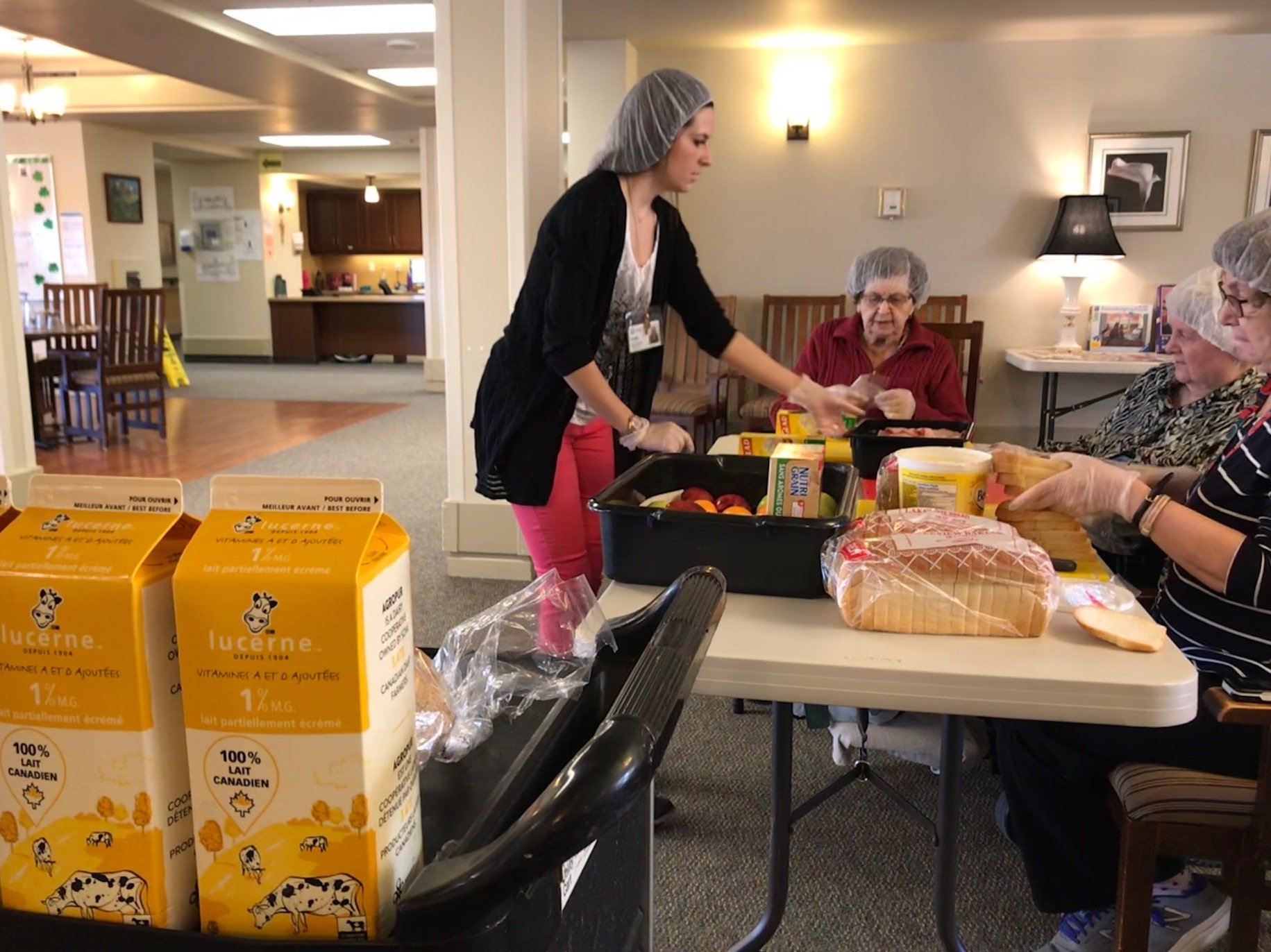Residents prepare school lunches for kids in need

June 3, 2019
By Brenton Driedger, Social Media and Storytelling Advisor, Covenant Health
Every Tuesday morning, Sharon Schile takes her place on the sandwich assembly line.
Sharon, 73, carefully places a slice of ham between two pieces of bread before passing the sandwich on to be cut and bagged. She has been helping make sandwiches nearly every week for the past seven years.
The sandwiches are part of a school lunch program that sees residents from St. Therese Villa, St. Michael’s Health Centre and Martha’s House in Lethbridge prepare lunches that are delivered to local schools where there is a need. Sharon and her mom, Julia, who also lived in long-term care at St. Therese Villa, joined the program together soon after it started in 2012. Julia volunteered until a few months before her death in 2016 at the age of 102.
“The best part is knowing that children are getting a good meal for lunch,” says Sharon. “I get the joy of knowing I’m helping others.”
The lunches include sandwiches, fruit, granola bars and milk. Support for the school lunch program is provided by Covenant Foundation and its donors such as Precon, Independent Order of Odd Fellows Lethbridge Lodge, and others. Any leftover food is donated to a local homeless shelter before it spoils.

The lunch program provides valuable nutrition for students who don’t have enough to eat. For residents, it’s a social activity and an opportunity to give back to the community. For participants in the Post-Acute Rehabilitation Program (PARP) at St. Michael’s Health Centre, making lunches can also help their recovery.
“It’s an extension of their rehab while they’re here. Some patients have had a stroke, so they’re only able to use one hand,” says Colene McCuaig, Recreation Therapist. “Some patients who have had a stroke also have memory and comprehension problems, so getting them to do sequencing jobs of placing all of the lunch items in the bags helps them work on their cognition.”
Westminster School receives lunches every day. Principal Angela Wilde says hungry students struggle to learn. The lunches boost energy levels and improve mood.
“There’s also a social thing that happens about gathering for lunch at school,” says Angela. “Kids bring lunch, they compare foods at lunch, they talk, they socialize. It’s very much a community gathering time, so kids who don’t have lunch feel left out of that community gathering time.”
Judy Plett, a PARP patient at St. Michael’s Health Centre, remembers going to school without a lunch. She benefited from the generosity of others who provided her with food and wants to help a new generation.
“We didn’t have much, so we’d go to school and they’d give us milk and stuff like that. It was really appreciated,” says Judy, 71.
While spending a few weeks in the rehabilitation program, Judy is thankful for an activity that makes her feel productive. She is recovering from sciatica and a broken pelvis after suffering a fall at home.
“It makes me feel proud that I can help, makes me feel useful. (The staff) are all here helping me, so it makes me feel good that I can do something to help somebody else.”
Providing a sense of purpose is a big part of the program, says Tori Foder, Activity Assistant, St. Therese Villa.
“They love doing lunches. They know exactly when to come, what their day is, what to do, and they just love that they are helping the community and feeling that they’re needed,” says Tori.
At St. Therese, the lunch program is part of an ongoing relationship with the school. Students occasionally visit residents for activities like reading, singing or trick-or-treating.
But even patients or residents who don’t get to see the smiles on the students’ faces still enjoy the satisfaction of knowing their work makes a difference.
“I’m sure they appreciate it. I know I did when I was a kid,” says Judy. “It gives you a warm feeling knowing that you’re doing something that’s helping little kids.”